Learning about Innovation Culture with Amazon’s Eric Tachibana
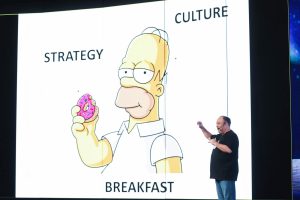 PETRONAS Leadership Centre (PLC) recently hosted “Working Backwards: The Culture of Innovation” on 8 February 2023, with 187 PETRONAS’ Innovation Masterclass (IM) Alumni from 26 Cohorts and Innovation Leaders from Innovation Engine, PING, SEEd.Lab, and FutureTech attending the session. Centered on the theme of ‘Culture vs. Strategy’ and organised by PLC Innovation Academy, the event was held at the new PLC campus.
PETRONAS Leadership Centre (PLC) recently hosted “Working Backwards: The Culture of Innovation” on 8 February 2023, with 187 PETRONAS’ Innovation Masterclass (IM) Alumni from 26 Cohorts and Innovation Leaders from Innovation Engine, PING, SEEd.Lab, and FutureTech attending the session. Centered on the theme of ‘Culture vs. Strategy’ and organised by PLC Innovation Academy, the event was held at the new PLC campus.
The talk was delivered by Eric Tachibana, the Head of Advisory for Asia Pacific, Japan and China, Amazon Web Services. Also known as the “Innovation Guru” and the founder of the Amazonian approach of working backwards, he is an important figure in codifying the working backwards for PETRONAS.
The day started with opening remarks from Head, PLC Innovation Academy, Khairul Faizi A Karim who mentioned that 27 IM sessions were conducted to date, with over 850 participants. A number sizable enough to create a community of innovators looking from the lens of customers, the heart of PETRONAS Working Backwards. Starting from 2023, PLC will emphasise the need and support for innovation through networks and collaboration. Focusing on innovation as a culture and not just sets of tools and frameworks, will lead to more ideas that challenge the norms.
Eric then took the stage to deliver his keynote, ’The Culture of Innovation – A Peculiarly Amazonian Approach to Culture @ Extreme Scale’.
In his TedTalk style presentation, Eric mentioned managers today spend 98% of their time focusing on strategy and spending little time on building a high-performing team culture. This is because managers are exposed to many tools and techniques for planning and implementing strategies. However, there are not as many tools established for managers to build a high-performing culture in the organisation.
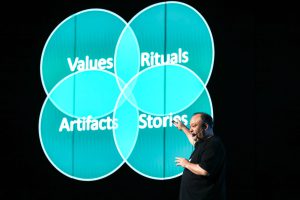 In explaining culture, Eric mentioned managers should be Cultural Engineers and approach culture in a systematic manner. Here he shared the four interlocking circles of Values, Rituals, Artifacts and Stories that form the experiences and shape culture in an organisation. All organisations have their own unique practices that will fall in any of the four circles.
In explaining culture, Eric mentioned managers should be Cultural Engineers and approach culture in a systematic manner. Here he shared the four interlocking circles of Values, Rituals, Artifacts and Stories that form the experiences and shape culture in an organisation. All organisations have their own unique practices that will fall in any of the four circles.
Rituals, are significant cultural artefacts that can transform an event, like a weekly meeting, into one with a deeper significance. Leadership models the ideals, but rituals allow us to publicly promote those values. Changing a weekly gathering from a method of organising activities to something that emphasises the living out of ideals and celebrates them, maybe through a visual artefact.
Stories, universally, are a way to depict culture. Far more powerful than a set of values on their own, these are the real-life stories of Teams and how they have achieved the values of an organisation. They surface the importance of the values and engage the audience of other Teams to develop interest in the culture.
Artefacts, are visual embodiments of the values of an organisation that can be attributed to a Team’s demonstration of those values. It can be a ‘shout-out’, a ‘token of celebration’ and can even be in the form of a prize (or bragging rights), something around which the Team can organise their activities to ‘win’, which then creates stories of those accomplishments.
Values, are a set of core beliefs of an organisation. For example in PETRONAS, they are Loyalty, Integrity, Professionalism and Cohesiveness, whereas at AWS, they are built around the 16 Leadership Principles. These are the beliefs around which we can emulate our individual and organisational behaviour, and celebrate demonstrations of these values. Rather than a list which we refer to occasionally, Eric’s call to action was to build Teams stories around it on a daily or weekly basis.
The further away the practice is from the four overlapping areas, the lesser its ability in shaping the culture that the organisation wants to create. The big idea is to think of ways to bring these practices to the centre of the interlocking circles.
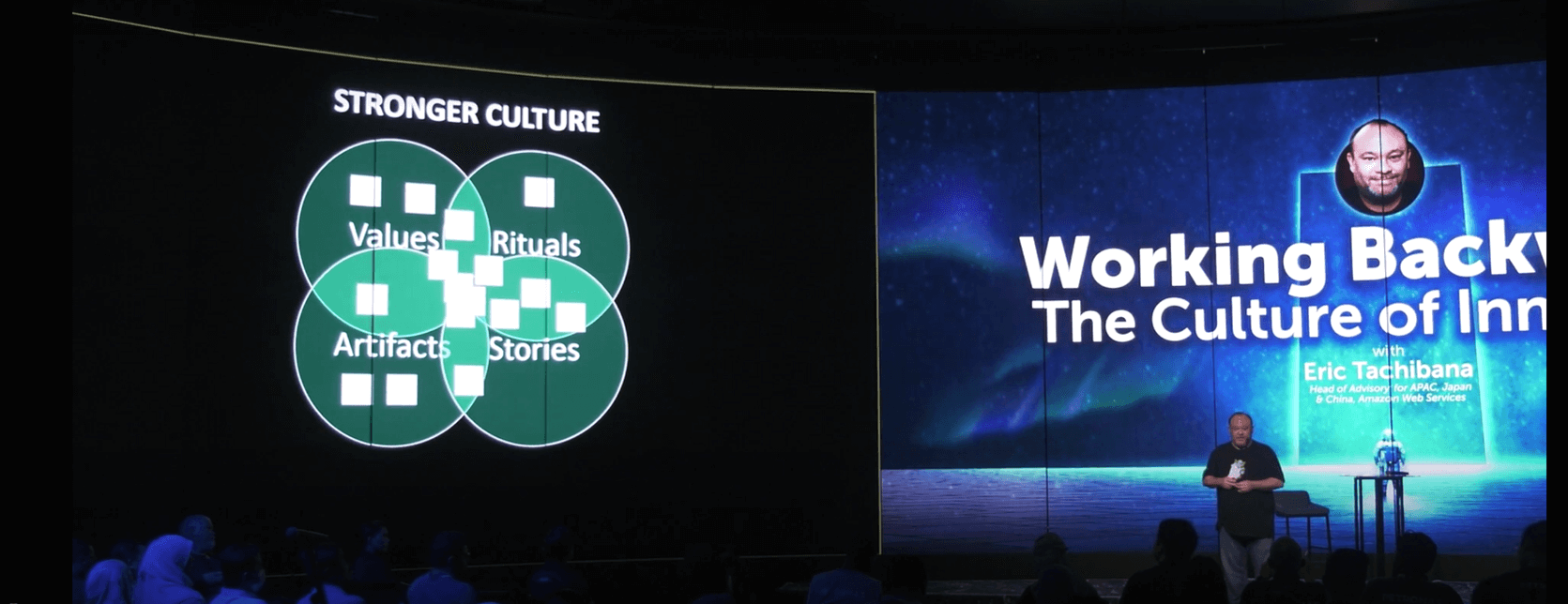
He cited an example of buying a rock from an aquarium shop and writing ‘You Rock!’ on it. During a meeting, after running through the agenda, in the first 5 minutes of every standup, they passed the rock to the team which had demonstrated the most value-driven behaviour. Instead of talking about it in terms of project milestones, they discussed what actually took place and how people behaved – that was their stories. So this was a ritual, with values, and stories all around an artefact. Those then became the stories which the team would tell others, leading to the building of culture!
Managers, as Cultural Engineers, would seek opportunities in their day-to-day team activities to enhance the culture experience that are pervasive and enduring.
After the main event, leaders from PING, FutureTech, Innovation Engine and SEEd.Lab then joined Eric for a more intimate conversation, facilitated by Khairul Faizi. The session aimed to unpack lessons and identify the way forward to create a culture of innovation, focusing on building network and communities with the key drivers and catalysts for innovation in PETRONAS.
After a networking lunch, Eric spent time with Innovation Masterclass Cohort 27 where he answered queries from the excited participants. Eric ended the day by vising PETRONAS Innovation Garage where he engaged PING participants on their ideas, Shark Tank style.
In conclusion, the event was a success as highlighted by the impressive Net Promoter Score (NPS) of 80. The insightful talk, round table conversations, and interactions have encouraged collaboration, ideation, and learning. Through PLC’s Innovation Academy, PETRONAS can nurture a strong innovation ecosystem and community to drive growth and transformation. Overall, the event left a lasting impression on attendees, and we look forward to continuing the momentum as we work together to build a culture of innovation.
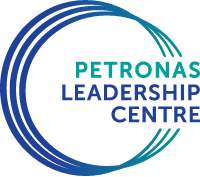
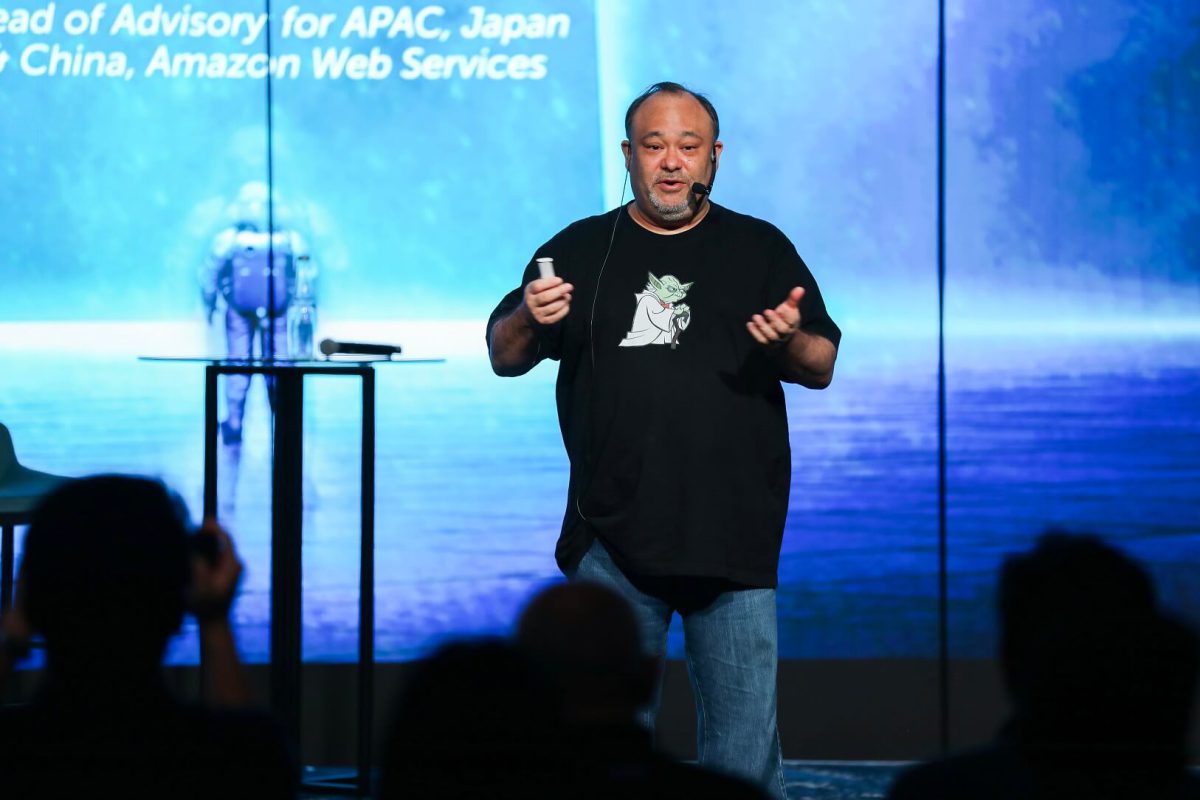
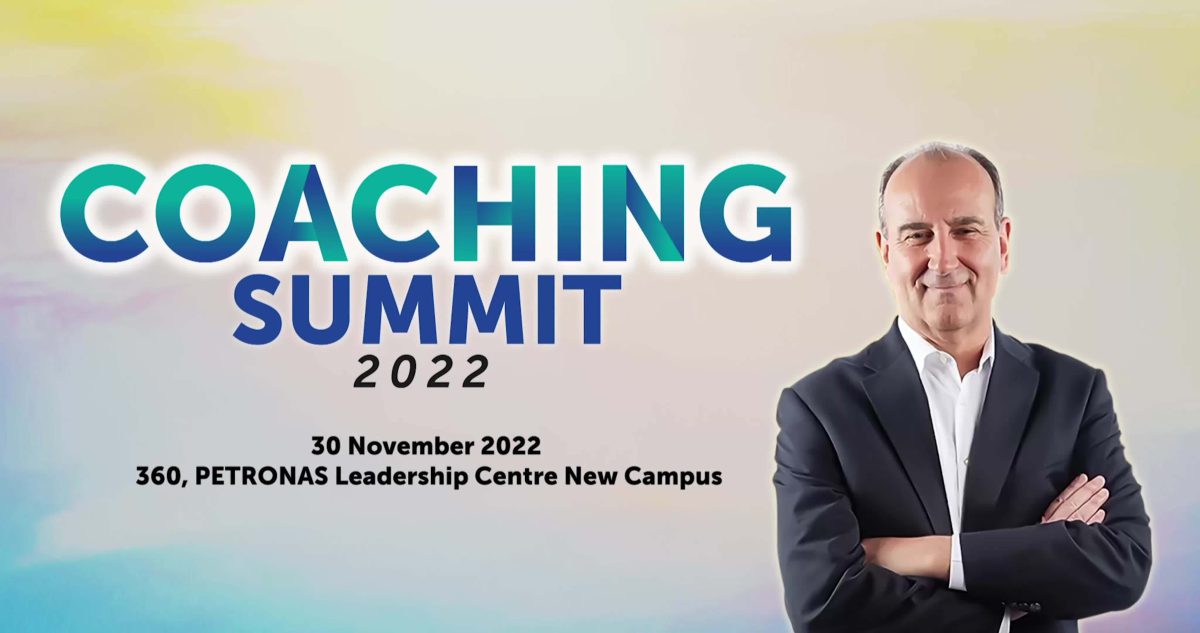
 PETRONAS Leadership Centre (PLC) recently completed its inaugural Coaching Summit 2022 on 30 November, with 157 PETRONAS coaches & leaders attending the session. The Summit, which centres on the theme of ‘Creating a Pervasive Coaching Culture to Sustain Success’, was organised by PETRONAS’ own Coaching Academy and held at the newly built PLC campus.
PETRONAS Leadership Centre (PLC) recently completed its inaugural Coaching Summit 2022 on 30 November, with 157 PETRONAS coaches & leaders attending the session. The Summit, which centres on the theme of ‘Creating a Pervasive Coaching Culture to Sustain Success’, was organised by PETRONAS’ own Coaching Academy and held at the newly built PLC campus.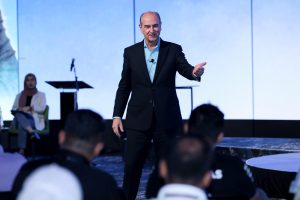 Dr Mattone then led the Coaching Experiential Learning before he was put in the spotlight for a conversation with participants. During the learning session, he shared his 50 Laws of Intelligent Leadership, emphasising participants’ selected Top 3 laws and asking them to share their thoughts. One of the laws highlighted was Law #17: It’s not about the organisation you want to create; it’s about the organisation you must create.
Dr Mattone then led the Coaching Experiential Learning before he was put in the spotlight for a conversation with participants. During the learning session, he shared his 50 Laws of Intelligent Leadership, emphasising participants’ selected Top 3 laws and asking them to share their thoughts. One of the laws highlighted was Law #17: It’s not about the organisation you want to create; it’s about the organisation you must create. 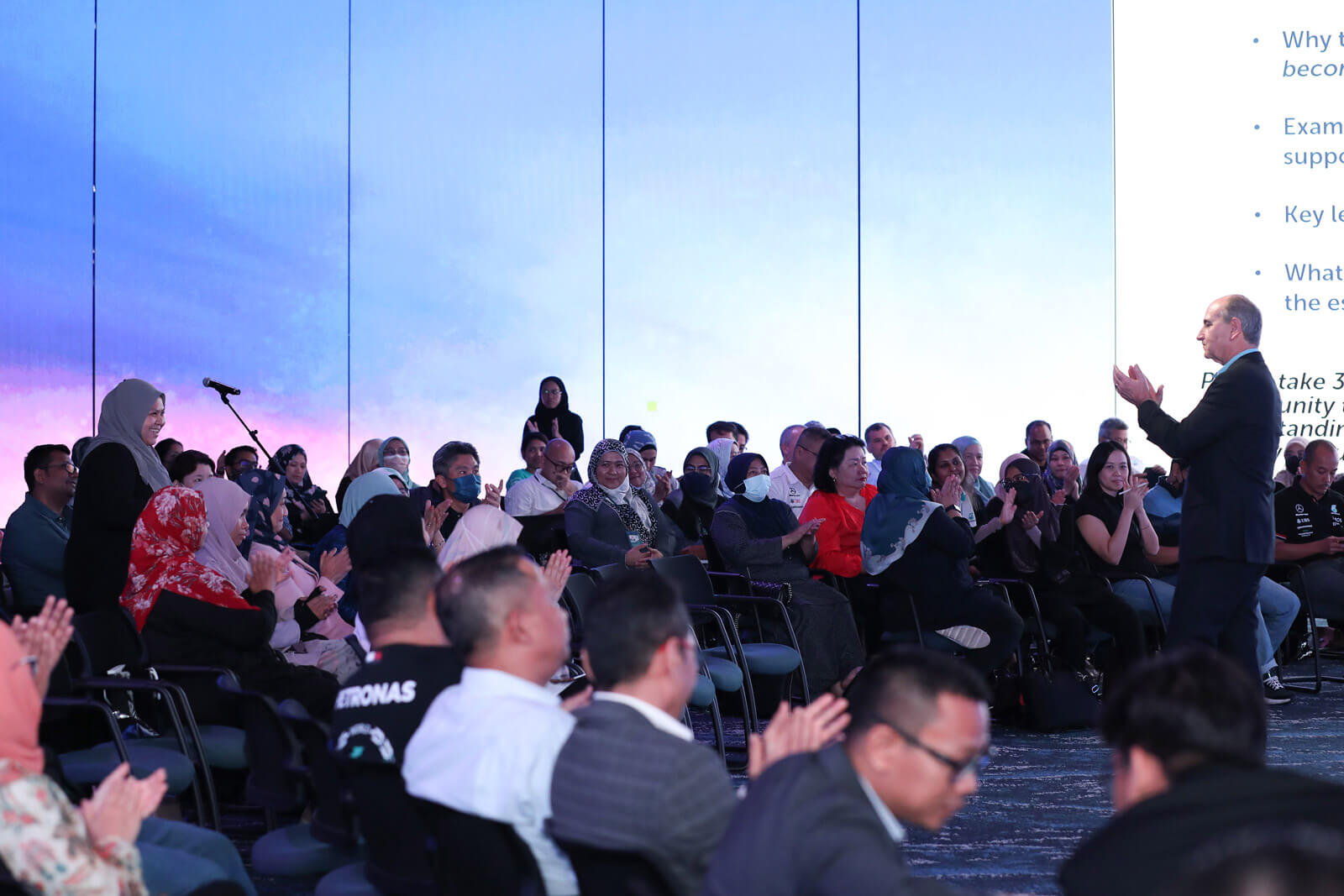
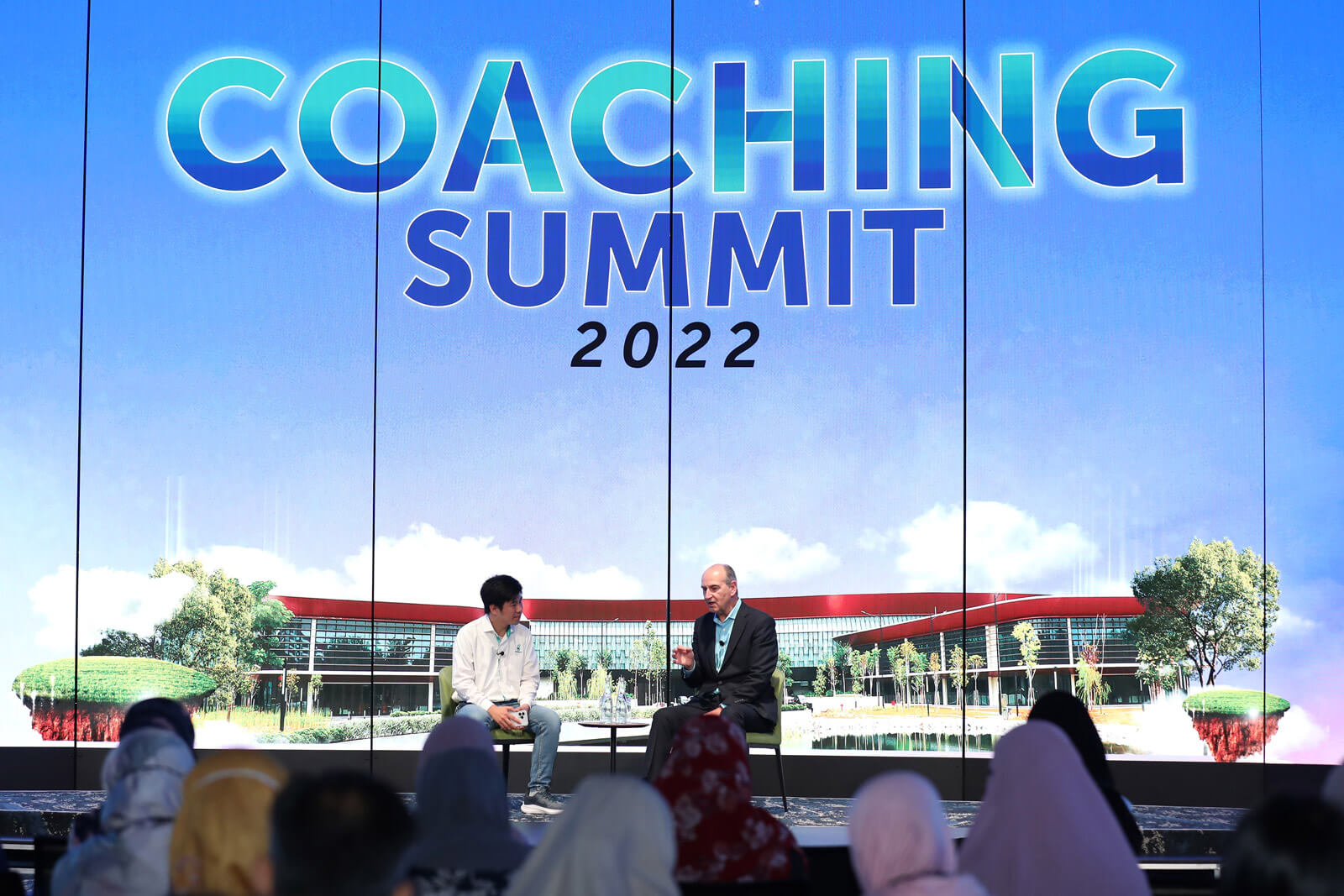
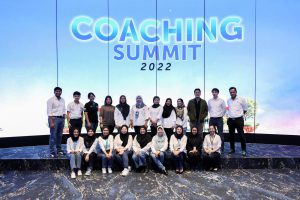 He also enlightened the audience on Mattone’s Leadership Enneagram Inventory (MLEI), a coaching tool used to identify predominant leadership styles and individuals’ maturity levels. This tool is part of the pre-work for the coaches and was used as a reference in the masterclass discussion, which yielded interesting insights for individual coaches on their own traits and level of maturity. He also provided tips to become successful leaders by enhancing the three traits, i.e., focusing on the highest scoring traits, least maturity ratio and lowest scoring trait.
He also enlightened the audience on Mattone’s Leadership Enneagram Inventory (MLEI), a coaching tool used to identify predominant leadership styles and individuals’ maturity levels. This tool is part of the pre-work for the coaches and was used as a reference in the masterclass discussion, which yielded interesting insights for individual coaches on their own traits and level of maturity. He also provided tips to become successful leaders by enhancing the three traits, i.e., focusing on the highest scoring traits, least maturity ratio and lowest scoring trait.